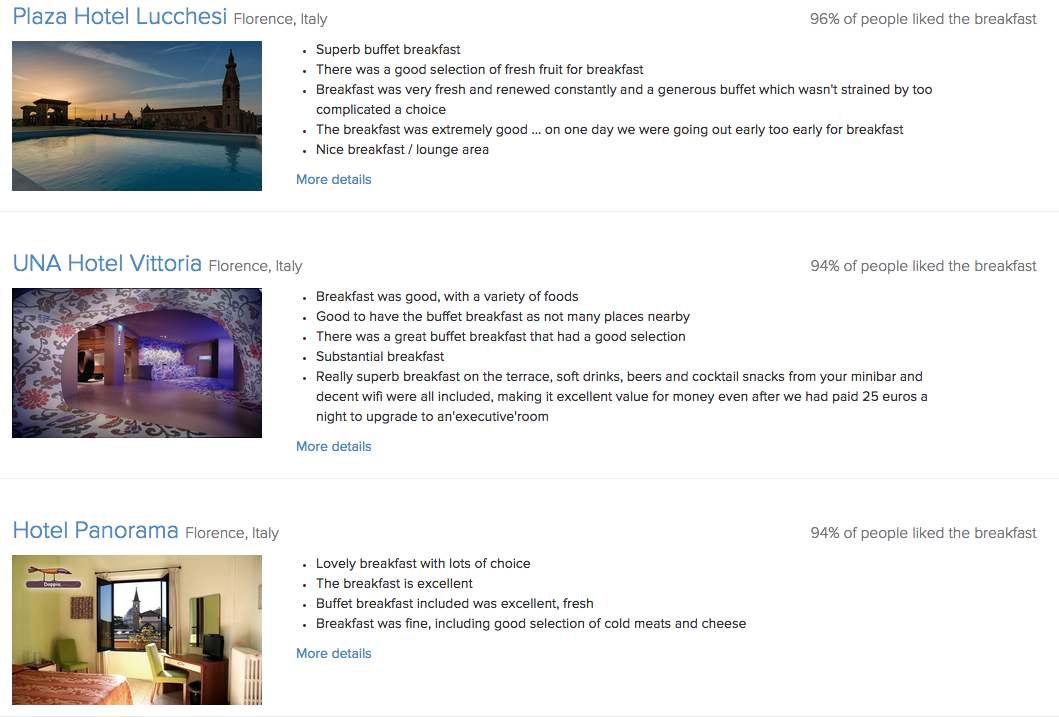HOTEL REVIEWS SENTIMENT ANALYSIS CASE STUDY
Helping people find the hotel they really want.
How do you turn millions of hotel reviews from completely different people into highly personalized suggestions for individual travellers? The answer lies in the semantic analysis of hotel reviews.
Start Your Free Trial
Hotel & Hospitality
The paradox of choice
Saavy travellers know to check hotel reviews before making a purchase. The reviews and opinions of fellow travellers rank jointly with price as the key determining factor in choosing where to stay. But one person's 5-star rating can be another person's 2-star rating. Some people might complain about the noise level at a hotel because of the nearby bars, while others might choose to stay at a hotel precisely because it is close to the nightlife. So much data to pour through, yet only a fraction is relevant for any given traveller.
Beward the 5-star rating
The advantage of the tried-and-true 5-star rating system is that everyone understands it. In theory, to decide which hotel is better is just a matter of doing a comparison of which hotel has a higher average star rating, but the trouble with these ratings is two-fold:
- The numbers are subjective; a 4-star hotel to one person is another person's 3-star hotel
- They often obscure the underlying nuance of a full hotel review.
Consider this real hotel review:
The main lobby is undergoing construction so there was a bit of noise, but not too bad. The rooms were nice and the check-in was smooth. When asked for a cab, I was put into a private car service with no meter and was charged an unfair price. I will not be back.
This person did not enjoy their stay at this particular hotel, as evident by the 2-out-of-5 star rating. But upon reading the full review and semantically breaking it down, was the hotel that bad?
The reviewer states that due to construction, there was some noise, but then says it wasn't too bad. The reviewer compliments the rooms and the check-in procedure. The one gripe seems to be about a bad taxi experience. Because of that, the hotel receives 2-stars for this review. But what if you're a traveller who doesn't care about taxi service. Does this hotel review accurately capture how you would enjoy staying at this property?
Personalized hotel recommendations
Putting this all together, the hotel review aggregator was able to provide a "smart" search - a search across hotel reviews based on semantic aspects of each hotel's reviews. Each hotel was then assigned an aggregate score based on each semantic category contained in the hotel reviews. This is what the smart semantic search widget looks like now:
One simple, smart, search box to find hotels that match the exact criteria a traveller is looking for. Here are the sample search results:
These hotels in Florence have the best breakfast:

Next steps
The unique features that can be built using Repustate's sentiment analysis for hotels are endless. Just one example: allowing for the creation of custom itineraries based on a person's preferences. A traveller specifies they want hotels with great spas for 8 nights in these 3 cities for this budget and away you go. A custom package can be created and booked in seconds. Repustate helps deliver a truly personalized experience that does away with the antiquated practice of coarse 5-star reviews.